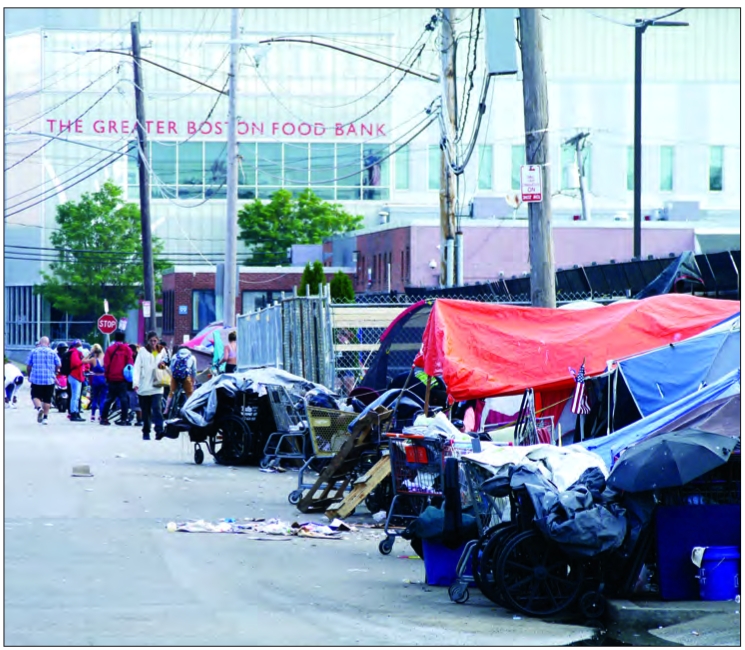
Encampment near intersection of Massachusetts Avenue and Melnea Cass Boulevard before tents were removed last year. Residents, families and business owners expressed concerns during a Boston City Council meeting last week about what they say is an increase in drug activity in their neighborhoods.
Since Mayor Michelle Wu removed the tents from Atkinson Street last year, neighbors and city officials said the problems have spilled over into the areas surrounding the Massachusetts Avenue and Melnea Cass Boulevard intersection.
Linda Zablocki, president of the Andrew Square Civic Association said after the installment of the camping ban, she and her neighbors have witnessed drug use around their homes and have experienced break-ins and thefts.
This “has made a quality of life in and around Andrew Square and … the South End and the adjoining neighborhoods even lower than what it has been. It is much more dangerous walking in our neighborhood,” she said. “We’re just moving a problem. We are not solving it.”
Councilor Ed Flynn, one of the council members who heard statements during the meeting, said families living in neighborhoods such as Andrew Square, the South End, Dorchester, Downtown Boston, Beacon Hill and Back Bay continue to complain about the safety issues related to increased drug activity.
“We need a comprehensive approach that involves all stakeholders, and we don’t have that right now,” Flynn said, adding that “it is important that our city demonstrates that we are serious in maintaining a zero-tolerance policy moving forward when it comes to public safety issues.”
He called for stronger law enforcement around the area known as Mass. and Cass, a “coordinated response” among the city and state to address addiction and homelessness, and state and federal resources to address Boston’s drug crisis.
Councilor Tania Fernandes Anderson pointed to the need for wraparound services and echoed the need for financial support, saying “one of the biggest issues is fiscal lack of money to really invest in the way that we know that our best practices have shown us that can actually effectively address this issue.”
Stephen Fox, chair of the South End Forum, said he was “skeptical” about whether the hearing would lead to real change “because we’ve been here a lot.”
“We have been doing band-aids for the past ten years and every year we come together, and we talk about this crisis, and we fail to finally embrace a strategic plan that addresses the long-term issue that we have been facing for the past decade,” Fox said.
He said he and his neighbors predicted that the removal of the tents would likely result in a spread of drug activity and felt the city had not taken the necessary steps.
“It’s a little disappointing that while we recognized what needed to happen … in terms of creating opportunities for recovery was not addressed,” Fox said.
The city council also heard from official response teams and experts at the city level, including Dr. Bisola Ojikutu, executive director of the Boston Public Health Commission, who said the city has made progress “by sustaining a public health and form response to homelessness and substance use disorder” and working beyond just the Mass. and Cass area.
She
highlighted Boston’s citywide efforts to address drug activity and
homelessness, including running shelter sites in the Mass. and Cass
area, funding organizations that serve unhoused populations, working
with the Boston Police Department, and co-leading the Nubian Square
Taskforce, which focuses on outreach and overdose prevention in drug
usage in the neighborhood.
Responding
to questioning from Flynn regarding data that showed that
overdose-related deaths in Boston had increased by 8.6% in 2023 despite a
statewide decrease, Dr. Ojikutu said new preliminary data indicated a
33% decrease in drug overdose deaths in the city in recent months. She
acknowledged the work ahead, saying the city needs a long-term plan that
includes low threshold shelters and treatment programs.
“We
have a system that is broken for people who are living with substance
use disorder, and I think that what we need is a much stronger continuum
of care for individuals who are living with substance use disorder and
who are unsheltered and that would solve a lot of the problems that
we’re facing,” she said.
Business
owners in Dorchester and South Boston said the relocation of drug
activity into neighborhoods surrounding Mass. and Cass has begun to
affect their businesses. Ryan Leeming, vice president of development at
Edens, which owns South Bay Center, told the city council that the mall
has had to re-consider its social programming and daily practices due to
safety concerns.
“We’ve
had to change how we operate our property. ... We’ve had to make it a
little bit less comfortable,” he said. “We’ve had to do simple things
like remove furniture, simple things like remove power outlets, simple
things like remove access to water, partner with our retail partners to
lock bathrooms.”
Leeming
and other business officials said they have had to spend money on
security and public safety measures after noticing a rise in loitering,
violence and drug use.
“This is an ongoing issue,” he said.